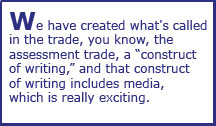KY: The WPA Outcomes Statement was formally adopted in 2000. Last summer at WPA, Irv Peckham at LSU and I hosted an afternoon session on Saturday. People could have been out seeing moose in Alaska, and instead they chose to think about technology. I'm sure that means we're all pathological! [Laughs]
|
It was a wonderful group. Not everybody was totally onboard with this, but they wanted to be engaged in the conversation, and we are going to carry that work forward. It's stalled a little bit because of [Hurricane] Katrina, and how Katrina has changed stuff for the folks at Louisiana State University as well as in New Orleans. Still, it is going to go forward, and I hope we'll bring something to the Executive Board for WPA by next summer. |
This move is also happening in the culture at large. Let me give you two assessment examples. One is an effort led by the National Center for Educational Statistics called the National Assessment of Adult Literacy. It's a measure of adult literacy conducted every ten years. They've looked at reading; they've looked at math; they have never looked at writing. They are looking at writing now. The next version is going to come out in another seven years, but there's a mid-term prototype that's being developed right now. There are three people composing it as we speak: a cognitive psychologist at Johns Hopkins, a person who does mostly ESL and writing assessment at Georgia State, and yours truly. We have created what's called in the assessment trade a “construct of writing,” and that construct includes media, which is really exciting. So we have electronic tasks that people will need to complete.
The other initiative is a national measure used for K-12 which looks at grades 4, 8, and 12. It's called the National Assessment of Educational Progress (NAEP), and the contract for the NAEP is going to come out in 2011. In the past, the assessment has been conducted by ETS, but it has been awarded this time around to ACT, which is a different testing organization. They are very serious about creating a test with electronic texts. As far as I know, we're not talking about digitized writing in the sense of electronic rating; that's another dimension. They want electronic writing, and they honest-to-goodness are not sure what that's going to mean. The first meeting [to discuss this question]is going to be in January, and I've been asked to be a consultant on that project.
KY: In my copious spare time! I mean, we're talking three [steering committee] meetings over the course of a year. There's a planning committee which is going to be much more engaged; that I could not do. For people who are not happy about electronic rating, I don't think you should go to multimedia composition so that you don't have electronic rating. That's confusing purpose and benefit. We should do multimedia composition for a lot of good reasons, and a benefit is that there is no e-rating system that can actually score a multimedia composition. If you think about it, that's pretty exciting. It actually requires a human being. Guess what? That keeps reading and writing social activities, which is what we know they are.

